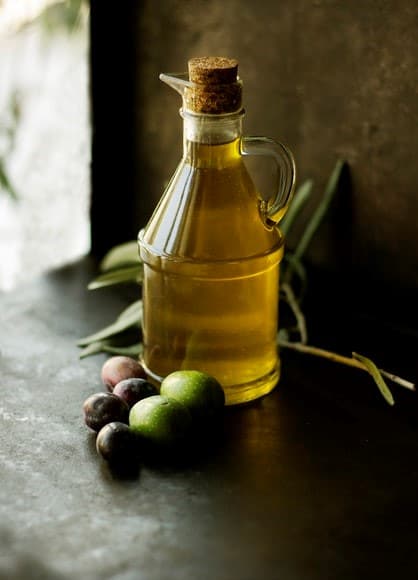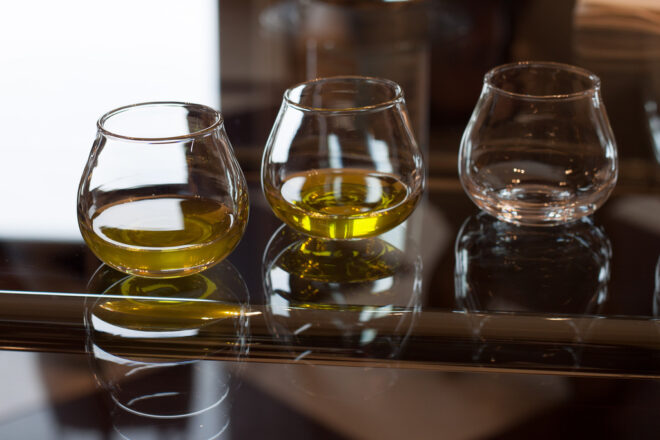
Herbs that grow wild in Sicily
If you take a walk in Sicily’s olive groves, specifically those smaller ones on the hillsides, you can find a

Want to spice up the flavour of your dishes without much effort? Infused olive oil is a great way to bring new flavours into your kitchen. You don’t need much more than high-quality olive oil and spices, herbs, lemons or some essential oils. There are hardly any limits – from garlic to lemon, rosemary, sage and basil, chilli and truffle – everything is possible. But care should be taken when making it.
To add flavour to your olive oil, you can either use herbs and spices or aromas in the form of essential oils.

Herbs and spices, especially fresh but also dried, can pose dangers. Adding spices and herbs can contaminate olive oil with Clostridium botulinum. Although it is possible to keep the bacteria at bay by following kitchen hygiene rules, not all bacteria can be removed from ingredients in household use.
What is Clostridium botulinum??
Clostridium botulinum is a bacterium that can multiply without oxygen and forms so-called spores. These spores are extremely resistant even to unfavourable environmental influences. During reproduction, neurotoxides can be formed, which can lead to the disease botulism in humans. Neurotoxides can be ingested by humans when eating contaminated food. Possible consequences: Nausea, vomiting, gastrointestinal disorders. In severe cases, typical signs of the disease occur, such as double vision, pupillary rigidity, speech disorders and later respiratory paralysis and suffocation while fully conscious.
Tip from the German Federal Institute for Risk Assessment: Be careful when using fresh products for flavoured oil. It is better not to produce in stock to reduce the risk of food poisoning.
One way to avoid this danger is to flavour olive oil with the help of aromatic oils. This prevents the formation of toxins and achieves oils that are equally rich in flavour. For this, you only need a few drops of high-quality aromas, which you can add to the olive oil. At il circolo we flavour our oil with high quality natural aromas and organic essential oils to bring out the flavours in a special way and to be able to carefully tune the intensity. Each in its own way: Al limone (lemon) for a fresh acidity, al rosmarino (rosemary) for a typically intense Italian flavour, al peperoncino (chilli) for that extra spice and al tartufo (truffle) for a rich earthy taste. You only need a few drops for a delicious result.
Some olive oil producers use a production process in which, for example, basil leaves, lemon peel or chilli peppers are already added to the olives during pressing. Of course, the olive oil also mixes with the essential oils in this process. However, due to its short processing steps and low temperature, the production process of an excellent olive oil is not ideal to extract the essential oils from the spices, herbs or lemon peels at the same time. Moreover, in order to avoid the proliferation of Clostridium botulinum, the olive oil is often exposed to high temperatures, which significantly reduces the quality of the olive oil.
Although it can be heated, our flavoured olive oil is best for seasoning just before serving. In a dish like pasta with almond and lemon pesto, a few drops of lemon oil can enhance the flavour enormously and leave a completely different dining experience.
You can also use flavoured olive oil to add extra flavour to a dish, for example a few drops of chilli oil on your minestrone will give the dish the spiciness you might need on a cold and rainy day. A drizzle of rosemary oil, on the other hand, would give the minestrone an intense herbal flavour. So it’s up to you how you spice up your dishes.
Curious about excellent olive oil that you can use as a base to make your own flavoured olive oil? Then you’ve come to the right place. You can find organic extra virgin olive oil in our webshop. 🙂
We import the olive oil ourselves from Sicily and can therefore guarantee the best quality. Take a look at our webshop and get to know our products!

If you take a walk in Sicily’s olive groves, specifically those smaller ones on the hillsides, you can find a

Into our 6th year of producing organic extra virgin olive oil, we at il circolo are becoming more and more

In the tranquil groves where olives have thrived for centuries, a lesser-known challenge shadows the olive oil industry: fraud. This

il circolo V.O.F.
Tacituslaan 7
3584AP Utrecht
Netherlands
[email protected]
tel: +31 (0)6 42254141
KvK/HRB: 74704257
BTW/MwSt: NL859998502B01
5 euro discount on your next purchase?
Sign up for our newsletter with tasty recipes and interesting background stories about il circolo olive oil and receive a discount code for yourself and your friends (displayed after email confirmation).
This website uses cookies so that we can provide you with the best user experience possible. Cookie information is stored in your browser and performs functions such as recognising you when you return to our website and helping our team to understand which sections of the website you find most interesting and useful.
Strictly Necessary Cookie should be enabled at all times so that we can save your preferences for cookie settings.
If you disable this cookie, we will not be able to save your preferences. This means that every time you visit this website you will need to enable or disable cookies again.